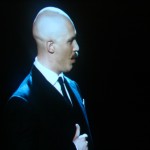A note on Tom Hardy and the film ‘Bronson’
Back when The Wrestler was released two years ago I read this quote describing Mickey Rourke in the film; “A harmonic convergence of player and part that happens only once in a blue moon.” That’s from David Ansen of NewsWeek. Once in a blue moon? Ansen must’ve missed Tom Hardy in Bronson, released in the same year. If Rourke’s performance is a blue moon then Hardy’s is Halley’s Comet.
It’s a one man show! Starring Britain’s most violent prisoner and most expensive mental patient. He stands before a captive audience, breaking the forth-wall as he addresses us directly and announces, “I’ve always wanted to be famous.” But he can’t sing, ball or act so his options are limited. Yes, he has a violent streak, he’s had it since childhood, so it’s a life of crime for Michael Peterson (who later adopts the moniker Charles Bronson).
When Peterson is first arrested it’s for a relatively small crime; he steals 18 quid from a post office and then is sentenced to 7 years. The sentencing is  comedic, in fact a lot of this film is comedic. It’s a tragicomedy that just happens rank among the most violent films. In fact, Danish director Nicolas Winding Refn shows tremendous skill in implementing an almost Kubrickian sensibility in both his visual style, his surreal approach to violence and his ability to extract raw performances from his actors.
comedic, in fact a lot of this film is comedic. It’s a tragicomedy that just happens rank among the most violent films. In fact, Danish director Nicolas Winding Refn shows tremendous skill in implementing an almost Kubrickian sensibility in both his visual style, his surreal approach to violence and his ability to extract raw performances from his actors.
But how does a man go from sticking up a post office for 18 quid to being the most violent criminal in Her Majesty’s Prison Service? I think it looks like simple boredom. But he is presented to us as a man who loves prison. He loves his “hotel room,” as he calls it, and he loves to strip down naked smear himself in butter and go bare-knuckle to riot-gear against a slew of prison guards. And Hardy presents this to us with such bravery and uncompromising dedication that you believe every second.
There’s an amazing moment where we cut back to the stage, as is done regularly throughout the film, where Bronson is split like Two-Face. One side is himself. The other side is made up to be a nurse from the mental hospital at which he 
 attempted to kill another patient. He whips back and forth, recreating a conversation – “when’s my trial!?” Bronson screams. “There isn’t going to be a trial.” The Nurse responds. “But I want my hotel room back.” – It’s a marvelous and inventive way to move the story along quickly, mixing again this surreal style with a bitter comedy and inspired theatrical performance.
attempted to kill another patient. He whips back and forth, recreating a conversation – “when’s my trial!?” Bronson screams. “There isn’t going to be a trial.” The Nurse responds. “But I want my hotel room back.” – It’s a marvelous and inventive way to move the story along quickly, mixing again this surreal style with a bitter comedy and inspired theatrical performance.
Bronson ends up being a surprisingly innovative biopic that some critics have dismissed as just being “a pointless exercise in morbidity.” But such an over-simplification of this film is board-line criminal. Refn’s bold profile of a violent man doesn’t shy away from the brutality of his life, but he does undercut the violence with his brilliant use of music, mixing rock, opera, classical and The Pet Shop Boys.
This is just another instance, in a long list of examples, that proves most awards are jokes. Sean Penn won the Oscar this year for his role in Milk. It’s a very good performance, but doesn’t belong in the same category as Hardy’s performance. It’s the equivalent of ignoring Charlotte Gainsbourg at the Oscars last year. But to hell with award shows simply recognizing studios trying their damnedest to promote their films to increase their box-office after spending a mint on an awards campaign. Awards can be a kiss of death to some. What has Gooding, Jr or Berry or Bullock or Paltrow done since their awards? Sometimes the award can be a mark of the end, not the beginning. Hardy’s performance here marks the beginning of a very exciting career and it will exist now as one of those fringe performances that wasn’t promoted relentlessly to the public. It is one you need to discover years later on Netflix on the recommendation of a rambling, lowly, fringe writer….